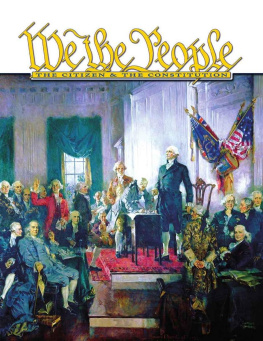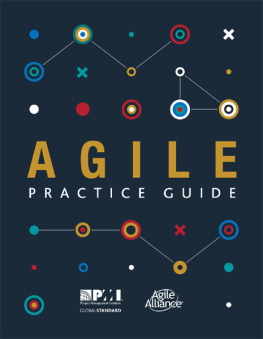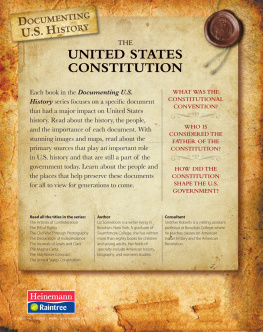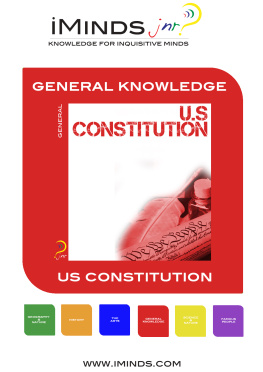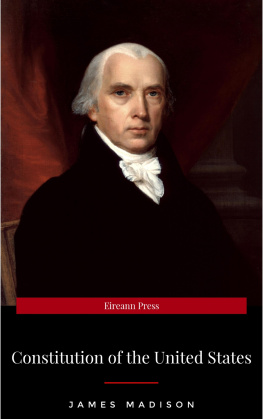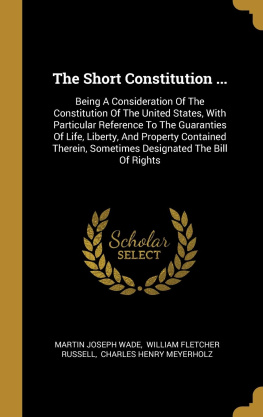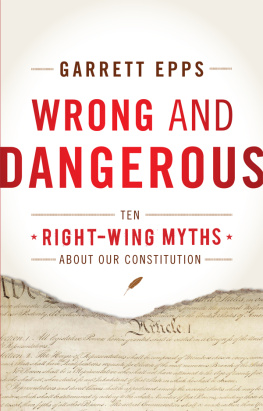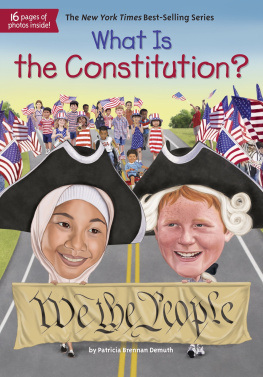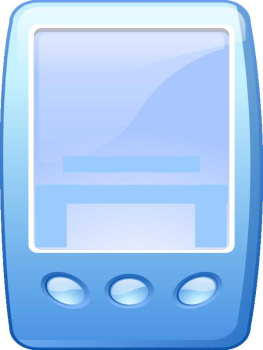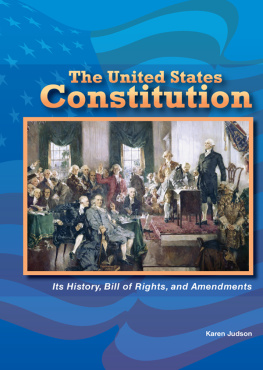coll. - We the People: The Citizen and the Constitution
Here you can read online coll. - We the People: The Citizen and the Constitution full text of the book (entire story) in english for free. Download pdf and epub, get meaning, cover and reviews about this ebook. year: 0, publisher: The Center for Civic Education, genre: History / Science. Description of the work, (preface) as well as reviews are available. Best literature library LitArk.com created for fans of good reading and offers a wide selection of genres:
Romance novel
Science fiction
Adventure
Detective
Science
History
Home and family
Prose
Art
Politics
Computer
Non-fiction
Religion
Business
Children
Humor
Choose a favorite category and find really read worthwhile books. Enjoy immersion in the world of imagination, feel the emotions of the characters or learn something new for yourself, make an fascinating discovery.
We the People: The Citizen and the Constitution: summary, description and annotation
We offer to read an annotation, description, summary or preface (depends on what the author of the book "We the People: The Citizen and the Constitution" wrote himself). If you haven't found the necessary information about the book — write in the comments, we will try to find it.
We the People: The Citizen and the Constitution — read online for free the complete book (whole text) full work
Below is the text of the book, divided by pages. System saving the place of the last page read, allows you to conveniently read the book "We the People: The Citizen and the Constitution" online for free, without having to search again every time where you left off. Put a bookmark, and you can go to the page where you finished reading at any time.
Font size:
Interval:
Bookmark:

19071995

Chief Justice of the United States 19691986
Chair, Commission on the Bicentennial of the United States Constitution
The years 1987 to 1991 marked the 200th anniversary of the writing, ratification, and implementation of the basic documents of American democracy, the Constitution and the Bill of Rights. Our Constitution has stood the tests and stresses of time, wars, and change. Although it is not perfect, as Benjamin Franklin and many others recognized, it has lasted because it was carefully crafted by men who understood the importance of a system of government sufficiently strong to meet the challenges of the day, yet sufficiently flexible to accommodate and adapt to new political, economic, and social conditions.
Many Americans have but a slight understanding of the Constitution, the Bill of Rights, and the later amendments to which we pledge our allegiance. The lessons in this book are designed to give you, the next generation of American citizens, an understanding of the background, creation, and subsequent history of the unique system of government brought into being by our Constitution. At the same time, it will help you understand the principles and ideals that underlie and give meaning to the Constitution, a system of government by those governed.
Each year thousands of people visit our nations capital, Washington, D.C. They come as individuals, in families, and in school groups. Most are American citizens. Some are citizens of other countries. Among the most popular attractions for these visitors is a massive granite and lime stone building located on Pennsylvania and Constitution avenues, about halfway between the White House and the U.S. Capitol. This stately neoclassical building is the National Archives.

The main entrance to the National Archives is on Constitution Avenue. A broad staircase is flanked by statues representing Heritage and Guardianship. Atop the stairs stands an imposing colonnade with Corinthian capitals, echoing the architecture of classical Greece. The ceremonial entrance is guarded by one of the largest pairs of bronze doors in the world. Each door stands slightly more than thirty-eight feet high, spans almost ten feet in width, is eleven inches thick, and weighs six and a half tons. Beyond these doors and through a foyer visitors reach the most important room in the Archives: the Rotunda. Except on the most crowded days the peacefulness of this room contrasts sharply with the harsh daylight and traffic noise of the street outside. It is a place that commands silence and respect.
Along the wall opposite the Rotunda entrance is a set of bronzed titanium, marble, and glass display cases. The contents of these secure cases are preserved in argon gas. Each evening after the Archives closes its doors to the public, the contents of these cases are lowered by a hydraulic lift into a vault below. Every morning the contents are raised once again for public view.
The objects of all this care and attention are three documents. They are old. The parchment has been stained and frayed by the ages. The ink has faded. But the scars of time cannot diminish their importance. These three documents are our nations charters: the Declaration of Independence, the Constitution of the United States of America, and the Bill of Rights.
Many places and place names in our land have a special meaning to American s : Plymouth RockValley ForgeIndependence Hall Gettysburgthe Black HillsSelmaCape Canaveral. But if there were one place especially significant to all Americans, perhaps it would be here, in this room, in this building, the National Archives. Enshrined in these cases are not merely three important documents but also the essence of what America is all about, of what it means to be an American.
In these documents we find what defines us as a nation. We are not defined by religion, race, ethnicity, language, or national origin. We are defined by common commitments to the ideals contained in these documents. We are held together by our shared belief in values such as liberty, equality, and justice.
Our history has been a great adventure in ideas. This text will introduce you to that adventure. The individuals who founded this country believed in the importance and the power of ideas to change peoples lives.
You will learn where the ideas about liberty, equality, and justice come from and what they meant to the nations Founders and to the Framers of our Constitution. You will learn about the basic principles of government intended to protect each individuals right to the enjoyment of those ideas. You will learn what it means to be a citizen of a country committed to them.
The American historian Richard Hofstadter observed that America is the only nation that began in perfection and aspired to progress. The ideas on which America was founded may have been perfect, but we as a people have ever fallen short of perfection in realizing them. Our history is the story of a nation attempting to realize more perfectly the ideals on which it was founded. In a sense the pursuit of those ideals is never ending. Each generation in its own way has sought to live up to the promise of the nations founding, to realize for the future the perfection of the past. Eventually it will be your quest, as the rising generation of American citizens. You also will strive, in the words of poet Langston Hughes, to Let America be America again / The land that never has been yet.

Concept
The six units in this book examine important concepts, including the
- Historical and philosophical foundations of our countrys ideas about constitutional government
- Creation of the Constitution
- Expansion of rights since the ratification of the Constitution in 1788
- Organization of the national government
- Meanings of the various rights guaranteed in the Bill of Rights
- Roles of citizens in American democracy
Overview
Each unit consists of six or seven lessons with thirty-nine lessons in all. Each lesson focuses on a question related to the theme of the unit. Within each lesson is a series of other questions, followed by an explanation. Each lesson also contains a list of key words or phrases under the heading Terms and Concepts to Understand that are important for comprehension and that you should know when you complete the lesson.
Each lesson includes one or more What Do You Think? sections that will require you to reflect on what you have read. And in every lesson there are one or more Critical Thinking Exercises. These exercises provide opportunities to analyze and discuss problems or issues related to the subject of the lesson. The Critical Thinking Exercises are intended not only to increase your understanding of the material but also to develop skills that will prove useful to you as a citizen. Finally, each lesson concludes with several questions that will allow you to test your knowledge and understanding of the material covered in that lesson.
Font size:
Interval:
Bookmark:
Similar books «We the People: The Citizen and the Constitution»
Look at similar books to We the People: The Citizen and the Constitution. We have selected literature similar in name and meaning in the hope of providing readers with more options to find new, interesting, not yet read works.
Discussion, reviews of the book We the People: The Citizen and the Constitution and just readers' own opinions. Leave your comments, write what you think about the work, its meaning or the main characters. Specify what exactly you liked and what you didn't like, and why you think so.

